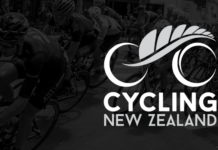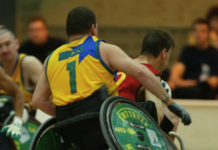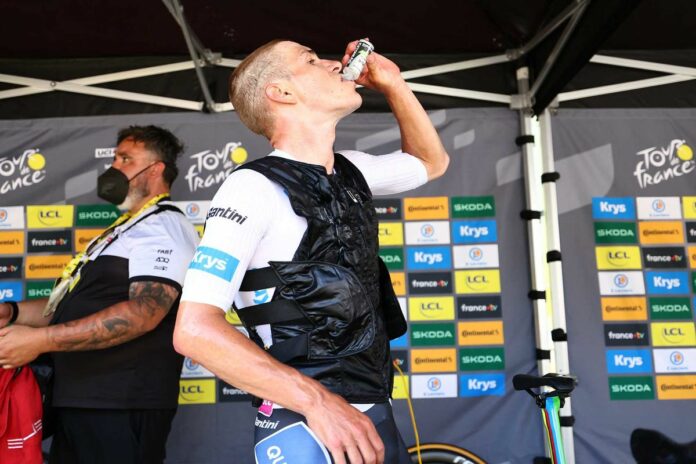Cross the line, lean back, and glug, glug, glug. And we’re done – another brand-friendly Tour de France shot of Remco Evenepoel knocking back a small bottle of KetoneAid. Nearly every day seemed a facsimile of the day before with the Belgian rider shaking out every drop in search of… what exactly?
What were the likes of Remco and his Soudal Quick-Step teammates seeking from the 60ml, 30g ketone ester bottle? And what about Visma-Lease a Bike riders who have a research partnership with Ketone-IQ, manufactured by HVMN?
What follows may well surprise.
Coming of age
Before we delve into the physiology behind ketones and their mooted benefits on cycling performance, arguably this year’s Tour de France is the one where ketones came of commercial age.
Since British Cycling and Team Sky reportedly used ketones to great success at the 2012 Olympics and Tour de France, respectively, cycling’s omerta has been alive and well, despite ketones being legal. This July, the smokescreen lifted.
“We’ve been using them for a while,” Visma-Lease a Bike’s performance nutritionist Martijn Redegeld tells us.
“Of course, I can’t share too many details around our exact protocols as that’s a competitive edge. What I can say is that if you look into the latest research around, it appears most of the benefits are tied in with recovery and training adaptation. I can also tell you that Jonas [Vingegaard] is one of the riders who doesn’t use ketones.”
This is arguably why the announcement of Visma’s “research partnership” featured Sepp Kuss and not the Dane. We’ll come back to why Vingegaard doesn’t partake shortly. But let’s dig back to the physiological rationale behind ketones.
For that, we turn to Javier Gonzalez. Gonzalez is a professor in the department of health at the University of Bath. He’s been there for around a decade, during which time he’s focused heavily on his research interests of carbohydrate and fat metabolism. Optimising both is the holy nutritional grail for performance-seeking cyclists, which is how he ended up researching ketones and working with Ineos Grenadiers between 2020 and 2022.
James Morton, professor of exercise metabolism at Liverpool John Moores University, followed a similar path, formerly working with Team Sky and now balancing his academic work with nutritionally heading up the Ineos Sport group. It’s a two-way win. The team taps into applied insights from the lab; the academic gets to apply their lab work on the world’s biggest stage.
“Most of the time we use carbohydrates and fats as our main fuel for exercise, but under very certain conditions – if fasted or on a high-fat, low-carbohydrate diet – we naturally start to produce ketone bodies,” Gonzalez explains.
“Our liver produces them, and these ketones can be used as a fuel by the brain and by our muscles.
“Because of their availability during times of low carbohydrate, it got people thinking: could you develop a nutritional supplement to provide the muscles with an alternative fuel? Could that enhance performance?”
British Cycling and Team Sky reportedly used ketones to aid their successes at the 2012 Olympics and Tour de France. (Image credit: Getty Images)
Recovery seems key
Initially, research focused on consuming ketones before a tough bout of exercise that would normally drain glycogen levels (glycogen is how you store carbohydrates in the body), the idea being that ketones would spare these limited glycogen reserves (that reportedly max out at around 500g) and so give riders an extra physiological gear.
“But the results of taking ketones right before or even during exercise were pretty much all over the place,” says Gonzalez. “There was more promise in terms of recovery.”
Gonzalez references the work of exercise physiologist Peter Hespel, who’s a professor at Leuven University and a consultant for Soudal Quick-Step. The Belgian’s undertaken several studies into ketones including one where he had subjects complete a brutal three-week training programme, often training twice a day, to simulate the catabolic state (muscle breakdown) Tour riders enter.
After each session, they received a dose of ketones. One of the major findings was that if you looked at the placebo group, despite the training load increasing by 30% over three weeks, energy intake remained constant. They didn’t increase energy intake to compensate for the higher energy expenditure. However, the ketone group increased energy intake without giving them any recommendations for doing so.
This is important as insufficient calorie intake and catabolic exercise results in health issues like upper-respiratory infections during the third week of a Grand Tour, plus performance decrements like reduced power output.
The key mechanism at play seemed to be suppressing the rise of the stress-induced hormone GDF-15, which is involved in appetite regulation. In a three-week stage race, the normal pattern is a gradual increase in GDF-15 concentration that deadens the desire to eat. With ketones, this rise was reduced and so riders ate more, resulting in stronger performance (or a lower rate of decline). Hespel also showed riders slept better after taking ketones, which could have been down to reducing nightly levels of epinephrine (adrenaline).
“Hespel’s research proved important and showed that ketones were able to blunt the negative effects of a Grand Tour like overtraining,” says Redegeld.
“There’s also evidence that ketones can help with the refuelling of your muscle glycogen, which is a key strand of recovery, especially in stage racing when recovery time is really limited. Sleep quality is a big win, too. Riders have reported feeling better recovered and fresher in the morning.”
In this cycling world of data points galore, we stop Redegeld in his tracks and ask if the anecdotal matches the empirical? Do they have hard and fast data that riders recover and sleep better?
“Well, we obviously collect a lot of data, but it’s really hard to pinpoint results to one intervention or another. But we’re big believers in ketones’ ability to improve sleep no matter what a Garmin watch or Oura Ring says. Feeling is still one of the best indicators.”
So, the sight of Remco et al doffing a ketone drink post-finish has recovery merits. He could also be sparing liver glycogen stores, which Gonzalez says has promising evidence behind it.
Preserving protein stores to preserve muscle mass is another potential win, he adds, and there’s further research that says ketones are a ‘brain fuel’, so it can maintain or improve cognitive performance.
Ketones boost EPO
There is also the extraordinary 2023 research conducted by Gonzalez that showed ketone ingestion increased EPO response by 20% compared to the placebo group?
It’s the first study to show that ketones increase the blood-boosting hormone.
“We feel in this case ketones could be acting as signalling molecules to stimulate the kidneys to secrete more EPO,” he says.
“Obviously, many cyclists have heard of EPO and have negative connotations because the sport has a history of using the synthetic version. What we don’t know at this stage is whether the increase is enough to stimulate new red blood cells. We need to do that study but ketone studies are costly.”
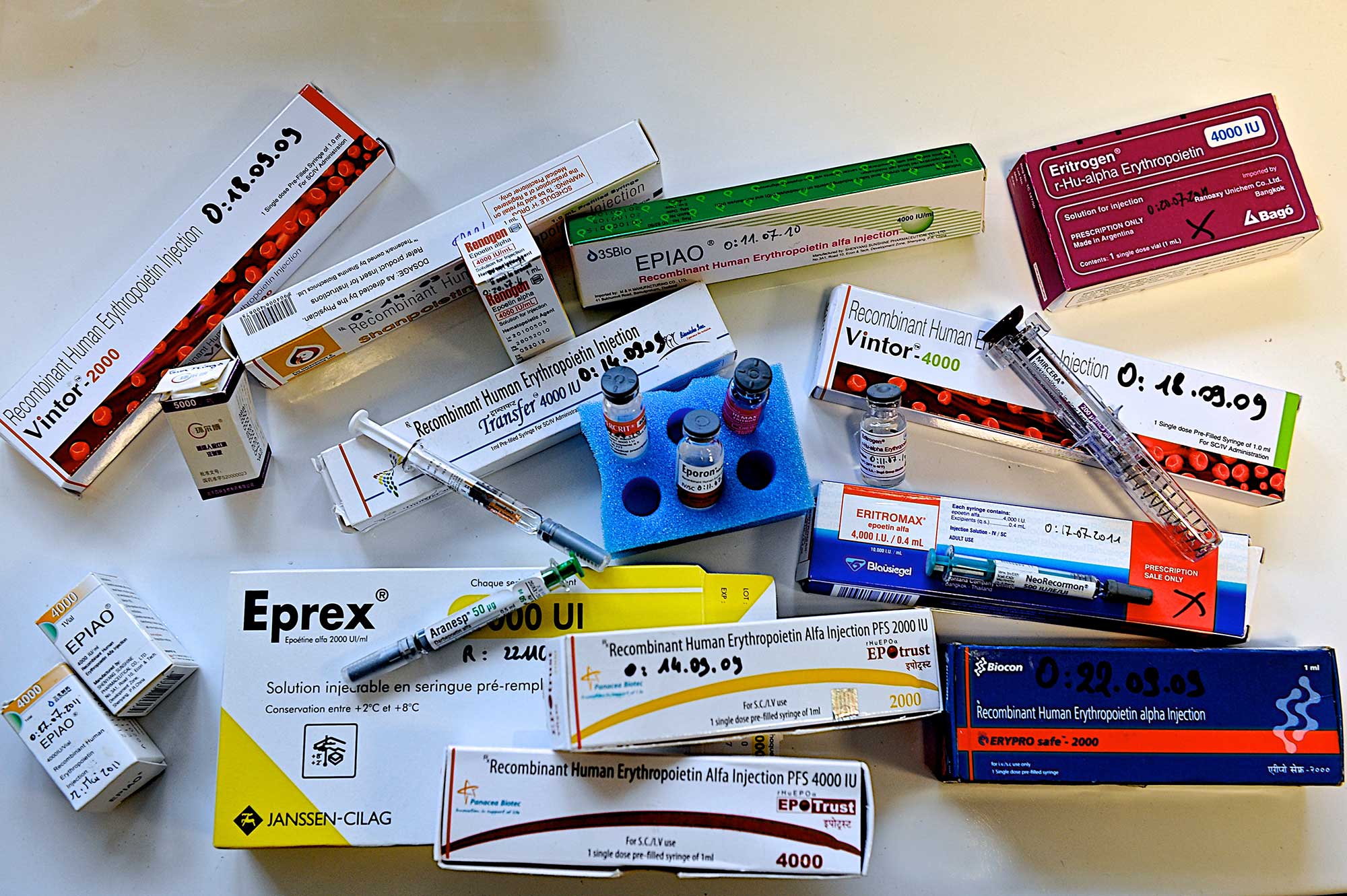
Ketones’ link to increased EPO naturally raises eyebrows given the negative connotations it has with cycling’s past. (Image credit: Getty Images)
EPO levels naturally rise with exercise but, Gonzalez says, the ketone hit further cranked up this response.
If further studies show red blood cell count rises with that EPO boost, WADA (World Anti-Doping Agency) could have a decision to make as it bans substances that result in significant erythropoiesis-stimulating effects.
“It’s why cobalt is on the list,” says Gonzalez. “It’s an interesting one because cobalt is a mineral that we have in our diet and need for optimum function. However, studies have shown that if you heavily supplement with cobalt, it raises EPO levels and the number of red blood cells, which is why it’s on the prohibited list.
“Could the same happen to ketones? Theoretically yes if it does increase red blood cell mass but if I were to pin my hat on it, I think the effect is probably relatively modest compared to things like altitude training itself. It certainly wouldn’t have the impact of taking the drug EPO itself.”
Still, once Gonzalez’s research went live, he did “have a lot of interest from a variety of WorldTour teams, nutritionists and physiologists from all sports. How much it changed their practices I don’t know”.
Personalisation is key
What we do know is that as ketone use increases and seasons roll by, teams will become ever more precise about its delivery.
Take Visma-Lease a Bike who, says Redegeld, really believe in the power of individualisation and personalisation of everything.
“That’s reflected in a rider’s training and nutrition programme,” he says. “It’s the same with ketones. Bodyweight can be a factor in how much ketones a rider might consume. Timing matters, too. We can measure how long a rider’s blood is in a state of ketosis and whether they need a higher dose. Or even a lower dose.
“But at the end of the day, the rider makes the final decision with training, nutrition and ketones. We explain the benefits of the innovation but it’s up to them if they feel it will improve their performance. It’s why many riders use it but Jonas chooses not to.
Also, it’s worth noting that riders will use it in specific situations, like after a Grand Tour stage, and not every day. But again, our exact protocol won’t be disclosed as that’s a competitive advantage.”
This is why we don’t know why Vingegaard doesn’t tap into ketones’ mooted benefits.
Maybe it’s the taste, which though improved from years gone by, is still a cheek-clenching affair.
“Or like drinking gin and tonic,” says Redegeld. Clearly not a fan.
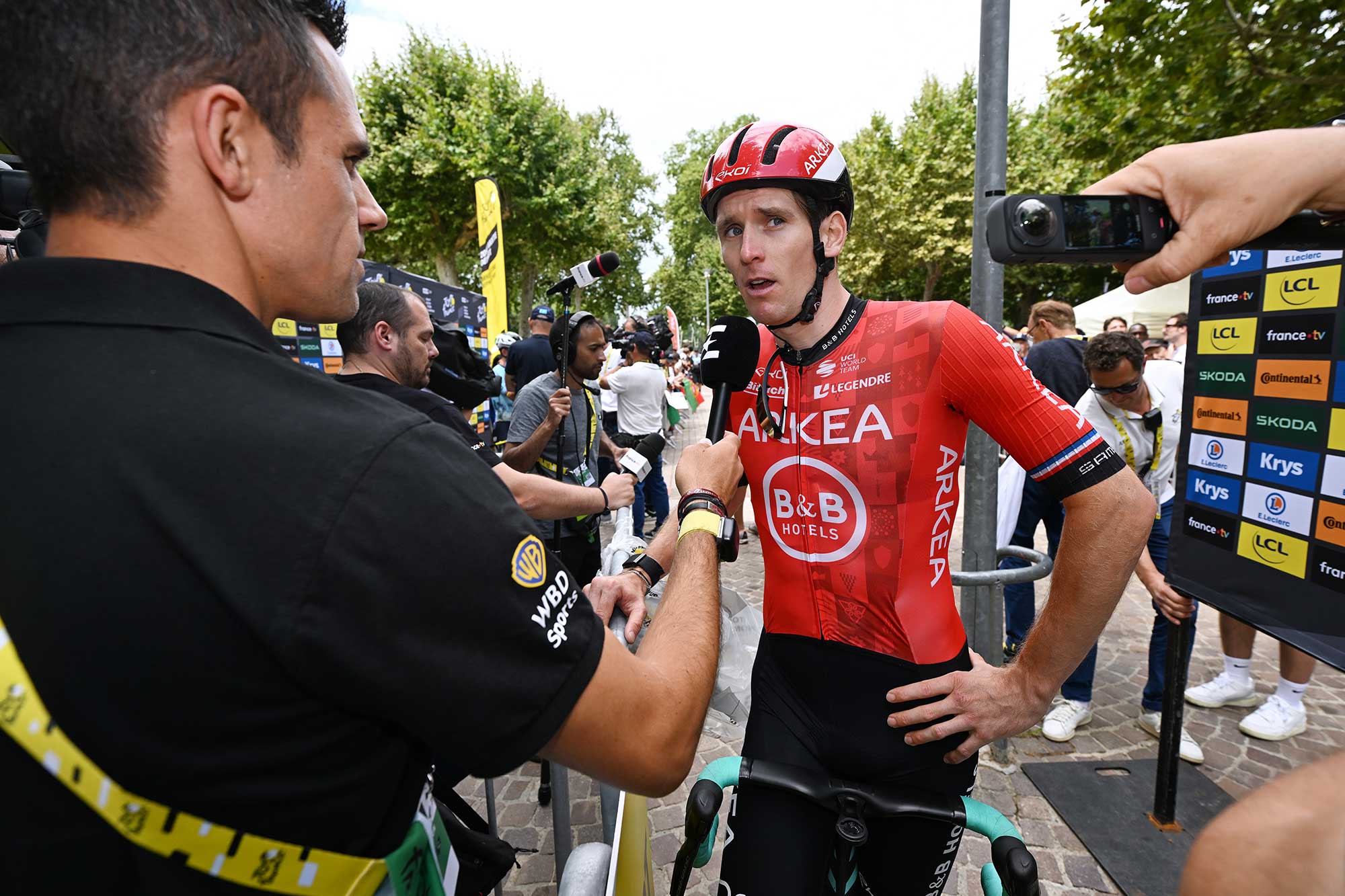
Arnaud Démare, one of the riders part of the Movement for Credible Cycling (MPCC), has previously raised his concerns regarding ketone use. (Image credit: Getty Images)
Esters all the way
There remains much conjecture about ketones, but what’s clear is that for riders to stand a chance of sparing liver glycogen, refuelling muscle glycogen, improving sleep, accelerating recovery and boosting EPO levels, they must go for ketone esters.
This is the concentrated form, which is needed as numerous studies show potential improvements derive from a blood-ketone concentration over 3mmol per litre of blood. Any less than that, which includes levels seen on a ketogenic diet, and any effect is much smaller. Ketone salts, on the other hand, are ketone bodies bound to a mineral like calcium, sodium or magnesium. Naturally, this is a diluter version, again dampening the effect.
That possible benefits of ketones are off limits for riders and teams signed up to the Movement for Credible Cycling (MPCC).
The MPCC’s stance on the ‘legal’ wonder drug is ‘to commit to the idea of non-use’, the lack of research into its long-term effects is one of the MPCC’s major concerns.
It’s left riders signed up to the MPCC lamenting its use. A few years back, Arkéa-Samsic’s Arnaud Démare, then racing for Groupama-FDJ, told French daily Le Parisien, “I wonder about the peloton, but I’m only saying what people are seeing. Not everyone has the same restrictions on certain products like ketones. I am part of a team that has made commitments, as have others. But the whole peloton is not like us.”
Riders have also stated its use had resulted in a two-speed peloton.
“That’s nonsense,” says Redegeld. “We believe that ketones provide a small advantage but nowhere near the magnitude that attracted all the hype years ago. And when it comes to long-term safety issues, that’s not a valid argument. How would any new good product hit the market? Wait 20 to 30 years to double-check its impact? There’s simply no evidence that it’ll cause long-term issues.”
Where does that leave us?
For Gonzalez, he sees the biggest wins in further studies into liver glycogen metabolism, prevention of muscle loss during injury and whether those raised EPO levels manifest in raised red blood cells.
If the latter is proven, ketones’ recent commercial omnipresence may be short-lived.
If you subscribe to Cyclingnews, you should sign up for our new subscriber-only newsletter. From exclusive interviews and tech galleries to race analysis and in-depth features, the Musette means you’ll never miss out on member-exclusive content. Sign up now
–
Source link : https://www.cyclingnews.com/features/weve-shown-that-ketones-boost-epo-levels-years-after-their-inception-what-impact-are-ketones-having-on-worldtour-performance/
Author :
Publish date : 2024-08-13 21:04:41
Copyright for syndicated content belongs to the linked Source.














